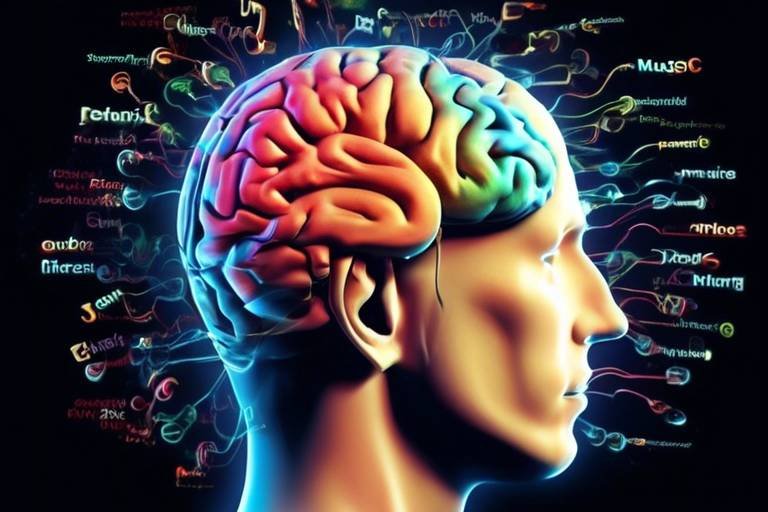How Food Affects Your Mood - The Science Behind Nutrition
Have you ever noticed how a simple bowl of pasta can lift your spirits, while a sugary snack might leave you feeling a bit down? This intricate relationship between food and mood is not just a coincidence; it's deeply rooted in science. Our dietary choices play a pivotal role in shaping our emotional well-being, often in ways we don't even realize. Understanding this connection can empower us to make better choices that enhance our mental health.
At the core of this relationship lies the concept of nutritional psychology, which studies how our diet affects our thoughts, feelings, and behaviors. This field is gaining traction as researchers uncover the biochemical processes that link the foods we eat to our emotional states. For instance, certain nutrients can influence the production of neurotransmitters—those chemical messengers in our brain that regulate mood, such as serotonin and dopamine. When we consume a diet rich in essential nutrients, we pave the way for a happier, healthier mind.
But what exactly are these nutrients, and how do they impact our mental health? Well, think of your brain as a high-performance engine. Just like a car needs the right fuel to run smoothly, your brain requires specific nutrients to function optimally. By making informed dietary choices, you can essentially tune up your mental engine, leading to improved mood and emotional resilience.
Moreover, the relationship between food and mood is not a one-way street. Our emotional states can also influence our eating habits. When we're feeling down, we might crave comfort foods, which are often high in sugar and unhealthy fats. This can create a vicious cycle where poor dietary choices exacerbate our emotional struggles. Recognizing this pattern is the first step towards breaking free and making choices that nourish both body and mind.
In this article, we will delve deeper into the fascinating science behind nutrition and its effects on mood. We will explore key nutrients that play a vital role in emotional well-being, such as omega-3 fatty acids, B vitamins, and the importance of gut health. By the end of this journey, you’ll not only understand how food affects your mood but also gain practical insights into how to enhance your emotional health through nutrition.
Understanding how nutrition influences mental health is crucial. This section delves into the biochemical processes that link dietary choices to emotional well-being, highlighting key nutrients that play a role in mood regulation.
Certain nutrients are vital for maintaining a balanced mood. This section examines the importance of vitamins, minerals, and fatty acids, explaining how deficiencies can lead to mood disorders and emotional imbalances.
Omega-3 fatty acids are essential for brain health. This subsection discusses their role in reducing anxiety and depression, along with food sources rich in these beneficial fats that can enhance mood.
Identifying dietary sources of omega-3 is important for mood enhancement. Foods such as fatty fish, flaxseeds, and walnuts are excellent sources. Incorporating these into your diet can be as simple as adding a handful of walnuts to your morning oatmeal or enjoying a salmon fillet for dinner.
The impact of omega-3 on brain function is profound. These fatty acids contribute not only to cognitive health but also to emotional stability, emphasizing their importance in daily nutrition.
B vitamins are crucial for energy production and brain function. This subsection highlights their significance in mood regulation and how they can prevent feelings of fatigue and irritability.
Emerging research shows a strong link between gut health and mood. This section discusses the gut-brain axis and how probiotics and a healthy diet can positively influence emotional well-being.
Probiotics play a significant role in gut health. This subsection explores how these beneficial bacteria can improve mood and reduce anxiety, along with food sources that promote a healthy gut microbiome.
Dietary choices heavily influence mood. This section examines how high sugar and processed food consumption can lead to mood swings and emotional distress, urging healthier alternatives for better emotional health.
- How does food affect my mood? Food impacts mood through its influence on neurotransmitters and hormones that regulate emotions.
- What foods should I eat for better mood? Incorporate foods rich in omega-3s, B vitamins, and probiotics for optimal emotional health.
- Can a poor diet lead to depression? Yes, deficiencies in essential nutrients can contribute to mood disorders.
- How long does it take for dietary changes to affect mood? It varies, but many people notice improvements within a few weeks of making healthier choices.

The Connection Between Nutrition and Mental Health
Understanding how nutrition influences mental health is crucial in today's fast-paced world. Have you ever noticed how a hearty meal can lift your spirits, while junk food might leave you feeling sluggish or irritable? This isn’t just a coincidence; it’s a reflection of the intricate biochemical processes that link what we eat to our emotional well-being. When we consume food, our bodies break it down into nutrients that play specific roles in brain function and mood regulation. For instance, amino acids from proteins are the building blocks of neurotransmitters, the chemicals that transmit signals in our brain. A lack of these essential nutrients can lead to imbalances that may manifest as anxiety, depression, or irritability.
Research has shown that certain nutrients can significantly impact our mood and mental health. For example, omega-3 fatty acids are known to reduce symptoms of depression and anxiety. Meanwhile, B vitamins are essential for energy production and cognitive function. A deficiency in these vitamins can lead to feelings of fatigue and irritability, making it harder to cope with daily stressors. Moreover, the gut-brain axis, which connects our digestive system to our brain, plays a pivotal role in our emotional state. A healthy gut microbiome can enhance mood and reduce anxiety levels, emphasizing the importance of a balanced diet rich in fiber and probiotics.
In essence, our dietary choices are not just about physical health; they are intricately tied to our mental health as well. When we nourish our bodies with whole foods, rich in vitamins, minerals, and healthy fats, we create a solid foundation for emotional stability. Conversely, a diet high in processed foods, sugars, and unhealthy fats can lead to mood swings and emotional distress. It’s a vicious cycle – poor nutrition can lead to poor mental health, which in turn can lead to unhealthy eating patterns. Therefore, making conscious choices about what we eat is vital for maintaining not just physical health, but also mental well-being.

Key Nutrients That Influence Mood
When it comes to our mood, we often think about the emotional aspects, but did you know that what you eat can significantly impact how you feel? The connection between nutrition and mood is a fascinating area of study, revealing that certain nutrients play pivotal roles in regulating our emotions. For instance, deficiencies in essential vitamins and minerals can lead to feelings of irritability, fatigue, and even depression. It's like trying to drive a car without oil; eventually, something is going to break down. Understanding these key nutrients can empower you to make better dietary choices that can enhance your emotional well-being.
Among the most influential nutrients are omega-3 fatty acids, B vitamins, and magnesium. Omega-3s, found in fish and flaxseeds, are known for their anti-inflammatory properties and their ability to support brain health. They work like a protective barrier for your brain cells, helping to reduce anxiety and depressive symptoms. B vitamins, on the other hand, are essential for energy production and cognitive function. They can help keep your mood stable, much like a well-tuned engine running smoothly. Magnesium deserves a mention too; this mineral has a calming effect on the nervous system and can help alleviate stress. A deficiency in magnesium may lead to increased feelings of anxiety and irritability, making it vital to include magnesium-rich foods in your diet.
Now, you might wonder, how can you ensure you're getting these essential nutrients? Well, it’s simpler than you think!
- Incorporate fatty fish like salmon and mackerel into your meals at least twice a week.
- Snack on nuts and seeds, particularly walnuts and flaxseeds, which are great sources of omega-3s.
- Include a variety of fruits and vegetables in your diet to boost your intake of B vitamins and magnesium.
Additionally, let’s not forget about the role of antioxidants, which can help combat oxidative stress in the brain. Foods rich in antioxidants, such as berries, dark chocolate, and green leafy vegetables, can contribute to a more balanced mood. Think of them as the body's natural defense army, fighting off the negative effects of stress and fatigue. In short, by focusing on a balanced diet rich in these key nutrients, you can fortify your mental health and pave the way for a brighter, more stable mood.

Omega-3 Fatty Acids
When we talk about brain health, one of the first nutrients that comes to mind is . These essential fats are not just buzzwords in the health community; they play a vital role in maintaining our mental well-being. Imagine your brain as a high-performance machine—Omega-3s are like the premium oil that keeps everything running smoothly. They help reduce anxiety and depression, making them crucial for anyone looking to enhance their mood.
Research has shown that Omega-3s can significantly impact our emotional state. For instance, studies suggest that individuals with higher Omega-3 levels tend to experience lower rates of depression. This is likely because these fatty acids help regulate neurotransmitters, the chemicals in our brain that send signals and affect our mood. When we have a deficiency in Omega-3s, it can lead to a host of emotional issues, including irritability and mood swings.
So, where can you find these mood-boosting fats? Here’s a quick look at some of the top sources:
- Fatty Fish: Salmon, mackerel, and sardines are packed with Omega-3s.
- Flaxseeds: These tiny seeds are a powerhouse of plant-based Omega-3s.
- Walnuts: A delicious snack that provides a good dose of these essential fats.
- Chia Seeds: These versatile seeds can be added to smoothies and oatmeal.
Incorporating Omega-3-rich foods into your diet doesn’t have to be complicated. You can start by adding a serving of fatty fish to your weekly meals or sprinkling some flaxseeds on your morning yogurt. Even a handful of walnuts can make a significant difference in your overall intake.
Moreover, the impact of Omega-3 on brain function goes beyond just mood enhancement. These fatty acids are known to contribute to cognitive health, helping with memory and focus. Think of them as the brain's protective shield, reducing inflammation and promoting better communication between brain cells. This is especially important as we age, as maintaining cognitive function becomes a priority.
In summary, Omega-3 fatty acids are not just important for physical health; they are essential for emotional and cognitive well-being. By making a conscious effort to include these beneficial fats in your diet, you can support your mental health and enhance your mood significantly.

Sources of Omega-3
When it comes to boosting your mood, incorporating omega-3 fatty acids into your diet is a game changer. These essential fats are not only crucial for maintaining brain health but also play a significant role in emotional well-being. You might be wondering, where can I find these magical omega-3s? Well, let’s dive into some of the best sources that can easily fit into your daily meals.
First off, fatty fish is a top contender. Think salmon, mackerel, sardines, and trout. Not only are these fish delicious, but they are also packed with omega-3s. Just a couple of servings a week can significantly boost your intake. If you’re not a fan of fish, don’t fret! There are plenty of other options available. For instance, flaxseeds and chia seeds are fantastic plant-based sources. Sprinkle them on your morning oatmeal or blend them into smoothies for a nutritious kick.
Another great source is walnuts. These crunchy nuts are not only tasty but also provide a hefty dose of omega-3s. You can enjoy them as a snack, toss them in salads, or even use them in baking. For those who prefer a more straightforward approach, omega-3 supplements like fish oil capsules are also available. However, it’s always best to get your nutrients from whole foods when possible.
Here's a quick overview of some excellent sources of omega-3 fatty acids:
| Food Source | Omega-3 Content (per serving) |
|---|---|
| Salmon (3.5 oz) | 2,260 mg |
| Flaxseeds (1 oz) | 6,388 mg |
| Walnuts (1 oz) | 2,570 mg |
| Chia Seeds (1 oz) | 5,055 mg |
| Sardines (3.5 oz) | 2,205 mg |
Incorporating these foods into your diet can be as simple as adding a serving of fish to your weekly meal plan or enjoying a handful of walnuts as a snack. The key is consistency. By regularly consuming omega-3-rich foods, you can help support not just your mood but your overall mental health.
So, the next time you're at the grocery store, keep an eye out for these omega-3 powerhouses. Your brain and mood will thank you for it!

Impact on Brain Function
When we talk about brain function, it’s impossible to overlook the profound impact that omega-3 fatty acids have on our cognitive abilities. These essential fats are not just a trendy buzzword; they are crucial for maintaining optimal brain health. Think of omega-3s as the oil that keeps the gears of your brain running smoothly. Without them, you might find yourself feeling sluggish, forgetful, or even a little foggy.
Research shows that omega-3 fatty acids are integral to the structure of brain cells. They help to form the membranes of neurons, which are the cells responsible for transmitting signals throughout the brain and nervous system. This is vital for everything from memory formation to emotional regulation. When you consume foods rich in omega-3s, you are essentially providing your brain with the building blocks it needs to function at its best.
Moreover, studies have indicated that a diet low in omega-3s is linked to an increased risk of cognitive decline and mental health disorders. Imagine your brain as a garden; without the right nutrients, the plants (or in this case, your thoughts and emotions) can become wilted and unproductive. In contrast, a diet rich in omega-3s can lead to improved mood and cognitive function, acting as a fertilizer that helps your mental garden thrive.
To illustrate the impact of omega-3 fatty acids on brain function, consider the following table:
| Omega-3 Sources | Benefits for Brain Function |
|---|---|
| Fatty Fish (e.g., Salmon, Mackerel) | Enhances memory and cognitive performance |
| Flaxseeds | Supports emotional stability and reduces anxiety |
| Walnuts | Boosts mood and overall brain health |
Incorporating these foods into your diet can be as simple as adding a serving of fish to your weekly meal plan or sprinkling flaxseeds on your morning yogurt. The key is consistency; just like a workout routine, the benefits of omega-3s compound over time. So, next time you're pondering what to eat, remember that your brain will thank you for choosing foods rich in these essential fatty acids.
In conclusion, the impact of omega-3 fatty acids on brain function is significant and cannot be ignored. They not only contribute to cognitive health but also play a crucial role in emotional well-being. By making conscious dietary choices that include omega-3-rich foods, you are investing in your mental clarity and emotional stability, paving the way for a happier, healthier you.
- What are omega-3 fatty acids? Omega-3 fatty acids are essential fats that your body cannot produce on its own, so they must be obtained through diet.
- How do omega-3s affect mood? Omega-3s help regulate neurotransmitters and reduce inflammation, which can lead to improved mood and lower anxiety levels.
- What foods are high in omega-3s? Foods like fatty fish, flaxseeds, chia seeds, and walnuts are excellent sources of omega-3 fatty acids.
- Can I take omega-3 supplements? Yes, omega-3 supplements are available, but it’s best to consult with a healthcare provider before starting any new supplement regimen.

B Vitamins and Their Role in Mood
B vitamins are often referred to as the unsung heroes of our diet, playing a critical role in energy production and cognitive function. These essential nutrients are not just about keeping our bodies energized; they have a profound impact on our mental health and emotional stability. Imagine trying to drive a car without fuel—this is akin to how we function without adequate B vitamins. They help convert food into energy, which is crucial for maintaining a balanced mood. When our bodies are low on these vitamins, we can experience feelings of fatigue, irritability, and even depression.
There are several B vitamins that contribute significantly to emotional well-being, including B1 (thiamine), B2 (riboflavin), B3 (niacin), B6 (pyridoxine), B9 (folate), and B12 (cobalamin). Each plays a unique role in brain function and mood regulation. For instance, vitamin B6 is essential for the production of neurotransmitters like serotonin and dopamine, which are critical for mood stabilization. A deficiency in B6 can lead to feelings of sadness and anxiety, much like a car that runs out of gas and cannot move forward.
Moreover, folate (B9) is particularly important for mental health. Research suggests that low levels of folate are associated with an increased risk of depression. Foods rich in folate, such as leafy greens, beans, and fortified cereals, can help boost your mood and energy levels. Similarly, vitamin B12 is crucial for maintaining healthy nerve cells and red blood cells. A lack of B12 can lead to mood swings and cognitive issues, making it essential to include sources of this vitamin, such as fish, meat, and dairy products, in your diet.
To give you a clearer picture, here's a table that summarizes the key B vitamins and their primary benefits related to mood:
| B Vitamin | Role in Mood | Food Sources |
|---|---|---|
| B1 (Thiamine) | Helps convert carbohydrates into energy; supports brain function. | Whole grains, pork, nuts. |
| B6 (Pyridoxine) | Essential for neurotransmitter production; regulates mood. | Poultry, fish, potatoes, chickpeas. |
| B9 (Folate) | Linked to lower depression risk; supports emotional health. | Leafy greens, legumes, fortified cereals. |
| B12 (Cobalamin) | Maintains nerve health; prevents mood swings. | Meat, fish, dairy products. |
In conclusion, ensuring adequate intake of B vitamins is crucial for maintaining a stable and positive mood. By incorporating a variety of B vitamin-rich foods into your diet, you can help support your mental health and emotional resilience. Remember, just as a well-fueled car runs smoothly, a body rich in B vitamins can navigate the ups and downs of life with greater ease.
- What are the best sources of B vitamins? B vitamins can be found in a variety of foods including whole grains, meat, eggs, dairy products, legumes, and leafy greens.
- Can I get enough B vitamins from a vegetarian or vegan diet? Yes, although it may require careful planning. Foods like legumes, nuts, seeds, and fortified cereals are great sources, but B12 may need to be supplemented as it's primarily found in animal products.
- How do I know if I'm deficient in B vitamins? Symptoms of deficiency can include fatigue, irritability, mood swings, and cognitive difficulties. If you suspect a deficiency, consult a healthcare professional for testing.

Gut Health and Its Effect on Mood
Have you ever felt a flutter in your stomach when you're anxious or a wave of calm wash over you after a satisfying meal? It turns out, the connection between our gut and our mood is more than just a feeling; it’s a scientifically backed phenomenon known as the gut-brain axis. This fascinating link suggests that the health of our gut can significantly influence our emotional well-being. When we think about our mood, we often focus on external factors like stress or sleep, but the truth is, the food we eat and the state of our digestive system play a pivotal role in how we feel on a day-to-day basis.
Recent research has revealed that our gut is home to trillions of microorganisms, collectively known as the microbiome. These tiny creatures are not just passive residents; they actively communicate with our brain through various pathways, including the production of neurotransmitters. For instance, did you know that about 90% of serotonin, the "feel-good" hormone, is produced in the gut? This means that what you eat can directly affect your serotonin levels, influencing your mood and emotional state.
Moreover, a healthy gut microbiome is essential for maintaining a balanced mood. When our gut is out of whack, whether due to poor diet, stress, or illness, it can lead to an imbalance in these microorganisms, which may result in increased levels of anxiety and depression. For example, a diet high in processed foods and sugars can lead to dysbiosis, a condition where harmful bacteria outnumber beneficial ones, further exacerbating mood disorders.
To support gut health and, in turn, improve mood, incorporating probiotics into your diet can be incredibly beneficial. Probiotics are live bacteria that provide health benefits when consumed in adequate amounts. They help restore the balance of the gut microbiome and can enhance mood by reducing symptoms of anxiety and depression. Foods rich in probiotics include:
- Yogurt
- Kefir
- Sauerkraut
- Kombucha
- Miso
Additionally, prebiotics—non-digestible fibers that feed the good bacteria in your gut—are equally important. Foods high in prebiotics include garlic, onions, bananas, and asparagus. By combining both probiotics and prebiotics in your diet, you can create a thriving environment for beneficial gut bacteria, which can contribute to a more stable mood.
In summary, maintaining gut health is crucial for emotional well-being. The intricate relationship between our gut and brain highlights the importance of a balanced diet rich in whole foods, probiotics, and prebiotics. By nourishing our gut, we can not only support our physical health but also enhance our mood and overall mental health.
Q: How does gut health influence mood?
A: Gut health influences mood through the gut-brain axis, where gut bacteria communicate with the brain, affecting neurotransmitter production and emotional regulation.
Q: What foods can improve gut health?
A: Foods rich in probiotics (like yogurt and sauerkraut) and prebiotics (such as garlic and bananas) can improve gut health and, subsequently, mood.
Q: Can poor gut health lead to anxiety?
A: Yes, an imbalance in gut bacteria can increase anxiety and depression symptoms due to its impact on neurotransmitter production.
Q: How long does it take to see improvements in mood after changing my diet?
A: While individual responses vary, many people notice improvements in mood within a few weeks of adopting a gut-friendly diet.

Probiotics and Mood Enhancement
When we think about our mood, we often focus on external factors like stress, sleep, and social interactions. However, there’s a fascinating aspect that many overlook: the health of our gut! Yes, you read that right. The gut is sometimes referred to as our "second brain," and for good reason. This is where probiotics come into play, acting as the friendly bacteria that not only aid digestion but also have a significant impact on our emotional well-being.
Research has revealed a compelling connection between gut health and mood regulation. You see, our gut houses trillions of microorganisms, and this complex ecosystem, known as the gut microbiome, plays a pivotal role in how we feel. Probiotics, which are live bacteria found in certain foods and supplements, can help maintain a healthy balance of these microorganisms. When this balance is disrupted, it can lead to issues such as anxiety and depression. Imagine your gut as a bustling city; if the roads are blocked (thanks to unhealthy eating habits), traffic (or in this case, communication between the gut and brain) gets jammed, leading to chaos in your emotional state.
So, how exactly do probiotics enhance mood? One of the key mechanisms is through the gut-brain axis, a bidirectional communication network between the gut and the brain. When you consume probiotics, they can influence the production of neurotransmitters, such as serotonin, which is often dubbed the "feel-good" hormone. In fact, about 90% of serotonin is produced in the gut! By fostering a healthy gut environment, probiotics can help boost your serotonin levels, leading to improved mood and reduced feelings of anxiety.
Moreover, probiotics can also help reduce inflammation in the body, which has been linked to various mood disorders. Chronic inflammation can alter brain function and contribute to feelings of sadness and irritability. By incorporating probiotics into your diet, you may be able to combat this inflammation and, in turn, enhance your emotional health.
Now, you might be wondering, "How can I get more probiotics in my diet?" Here’s a quick rundown of some delicious sources:
- Yogurt: A classic source of probiotics, yogurt is not only tasty but also versatile. You can enjoy it plain, with fruits, or as part of a smoothie.
- Kefir: Similar to yogurt, kefir is a fermented dairy product but has a thinner consistency and a more diverse range of probiotic strains.
- Sauerkraut: This fermented cabbage dish is not only a great topping for sandwiches but also packed with probiotics.
- Kombucha: This fizzy, fermented tea is a refreshing way to introduce probiotics into your diet.
- Miso: A staple in Japanese cuisine, miso is a fermented soybean paste that can be used in soups and marinades.
Incorporating these foods into your daily meals can be a delicious way to boost your gut health and, consequently, your mood. Remember, a happy gut can lead to a happier you!
- What are probiotics? Probiotics are live bacteria and yeasts that are beneficial for your digestive system and overall health.
- How do probiotics affect mood? Probiotics can enhance mood by promoting a healthy gut microbiome, which influences the production of neurotransmitters like serotonin.
- Can I get enough probiotics from food alone? While many foods are rich in probiotics, supplements can also be beneficial, especially if your diet lacks fermented foods.
- Are there any side effects of taking probiotics? Generally, probiotics are safe for most people, but some may experience mild digestive discomfort when first starting.

The Role of Sugar and Processed Foods
Have you ever noticed how your mood can swing like a pendulum after indulging in a sugary snack? It’s no coincidence! The foods we eat, especially those loaded with sugar and heavily processed ingredients, can have a profound impact on our emotional state. When we consume high amounts of sugar, our bodies experience a rapid spike in blood glucose levels, which can lead to a temporary burst of energy. However, this is often followed by a crash that leaves us feeling fatigued, irritable, and even anxious. It’s like riding a rollercoaster—thrilling at first, but ultimately leaving you feeling a bit queasy.
Processed foods, which are often high in refined sugars and unhealthy fats, can exacerbate these mood swings. These foods typically lack the essential nutrients our bodies need to function optimally. Instead of nourishing our bodies, they offer empty calories that fail to support our mental health. Research indicates that diets high in processed foods are linked to an increased risk of mood disorders, including depression and anxiety. This connection is alarming, as it highlights the importance of choosing whole, nutrient-dense foods over quick, convenient options.
Moreover, sugar can act as a double-edged sword. While it may provide a momentary sense of pleasure or comfort—think of that sweet slice of cake after a long day—it can also lead to long-term emotional distress. When we rely on sugar to cope with stress or sadness, we may find ourselves trapped in a cycle of cravings and guilt. This can create a vicious cycle where we seek out more sugar to feel better, only to feel worse in the end. It’s a classic case of short-term gain for long-term pain.
To illustrate this further, let's take a look at the impact of sugar and processed foods on our brain chemistry. Here’s a simple table that outlines some of the key effects:
| Effect | Description |
|---|---|
| Blood Sugar Spikes | Rapid increases in blood sugar levels followed by crashes, leading to mood swings. |
| Inflammation | Processed foods can increase inflammation in the body, which is linked to depression. |
| Nutrient Deficiency | High sugar diets often lack essential nutrients needed for mental health. |
| Cravings | Consuming sugar can lead to increased cravings for more sugar, creating a cycle. |
So, what can we do to break this cycle? The key lies in making conscious dietary choices. Instead of reaching for that sugary snack or processed meal, consider opting for whole foods that nourish both your body and mind. Foods rich in fiber, protein, and healthy fats can help stabilize blood sugar levels and keep your mood balanced. Think of incorporating fruits, vegetables, whole grains, and lean proteins into your meals. Not only will you feel better physically, but your emotional well-being will also benefit.
In conclusion, the role of sugar and processed foods in our diet cannot be underestimated. By being mindful of what we consume, we can take significant steps towards improving our mood and overall mental health. Remember, it’s not just about what you eat; it’s about how it makes you feel. So, the next time you’re reaching for that sugary treat, ask yourself: is this really what my body and mind need right now?
- Can sugar really affect my mood? Yes, consuming high amounts of sugar can lead to mood swings and emotional instability.
- What are some healthy alternatives to sugary snacks? Consider fruits, nuts, or yogurt as healthier options that can satisfy your sweet cravings without the crash.
- How can I reduce processed foods in my diet? Start by cooking more at home and choosing whole foods instead of packaged items.
Frequently Asked Questions
- How does food affect my mood?
The food you eat has a direct impact on your mood. Nutrients like omega-3 fatty acids, B vitamins, and probiotics can enhance emotional well-being, while processed foods and sugars can lead to mood swings. Think of your brain as a car; the better the fuel, the smoother the ride!
- What are the key nutrients for maintaining a balanced mood?
Key nutrients that influence mood include omega-3 fatty acids, B vitamins, and minerals like magnesium and zinc. These nutrients play crucial roles in brain function and emotional regulation. A well-rounded diet can be your best ally in keeping your spirits high!
- Can omega-3 fatty acids really help with anxiety and depression?
Absolutely! Omega-3 fatty acids are known for their anti-inflammatory properties and their ability to support brain health. They can help reduce symptoms of anxiety and depression. Incorporating foods like fatty fish, flaxseeds, and walnuts into your diet can make a significant difference.
- What are some good sources of B vitamins?
You can find B vitamins in a variety of foods. Whole grains, meat, eggs, dairy products, and leafy greens are all excellent sources. Adding these foods to your meals can help keep fatigue and irritability at bay, making you feel more energized and balanced.
- How does gut health influence my mood?
Your gut is often referred to as your second brain! A healthy gut microbiome can promote better mood and emotional health through the gut-brain axis. Eating fermented foods like yogurt, kimchi, and sauerkraut can help boost your gut health and, in turn, your mood.
- What role do probiotics play in mood enhancement?
Probiotics are beneficial bacteria that can have a positive impact on your gut health and mood. They help balance the gut microbiome, which is linked to emotional well-being. Foods like yogurt, kefir, and kombucha are great sources of probiotics to include in your diet.
- Why should I avoid sugar and processed foods for better mood?
High sugar and processed foods can lead to spikes and crashes in blood sugar levels, resulting in mood swings and irritability. Opting for whole, nutrient-dense foods can provide more stable energy levels and a more consistent mood. Think of it as choosing a marathon runner's diet over a sprinter's sugar rush!



















